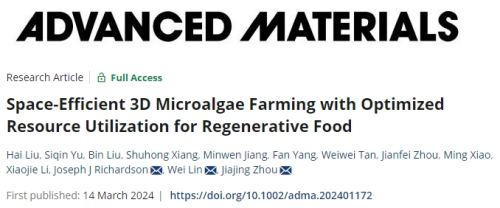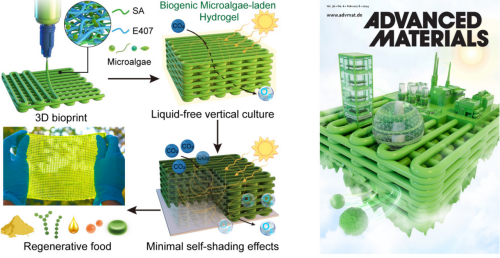
The distinguished research fellow Jiajing Zhou and research fellow Wei Lin's research team from the College of Biomass Science and Engineering collaborated with Professor Joseph J Richardson's team from RMIT University in publishing an online paper titled "Space-Efficient 3D Microalgae Farming with Optimized Resource Utilization for Regenerative Food" in the international academic journal Advanced Materials recently. This paper was selected to be the illustration on the first page of that journal. Hai Liu, a master graduate student from the CBSE is the first author. Jiajing Zhou, Lin Wei and Professor Joseph J Richardson are the co-corresponding author. This study is also assisted by thedistinguishedresearch fellow Xiao Mingte's team from College of Polymer Science and Engineering, professor Zhou Jianfei from College of Biomass Science and Engineering and Liu Bin's team from Shenzhen University.
With the global climate change and the population growth, the food system fails to meet the food supply needs of all mankind. According to the United Nations, nearly 820 million people cannot access to the food with adequate nutrition and 140 million children under the age of 5 areaffected by stuntingcaused by lacking ofnutrition. Thus, the development of new sustainable food sources is urgent. Microalgaeare abundant in proteins and other essential nutrients, making them an appealing option for combating malnutrition.However, traditional microalgae cultivation suffers from excessive water consumption and the self-shading effect. Moreover, it usually requires space-intensive open ponds or capital-intensive photobioreactors, and is practically impossible to harvest these unicellular algae without specialized microalgae dewatering facilities.These limitations, impeding the practical implementation of microalgae-based food production systems, underscore the need for innovative approaches to optimize the efficiency and sustainability of microalgae cultivation as a viable food source.

"Photosynthetic microalgae produce valuable metabolites and are a source of sustainable food that supports life without compromising arable land. However, the light self-shading, excessive water supply, and insufficient space utilization in microalgae farming have limited its potential in the inland areas most in need of regenerative food solutions. Herein, this work develops a 3D polysaccharide-based hydrogel scaffold for vertically farming microalgae without needing liquid media. This liquid-free strategy is compatible with diverse microalgal species and enables the design of living microalgal frameworks with customizable architectures that enhance light and water utilization. This approach significantly increases microalgae yield per unit water consumption, with an 8.8-fold increase compared to traditional methods. Furthermore, the dehydrated hydrogels demonstrate a reduced size and weight (≈70% reduction), but readily recover their vitality upon rehydration. Importantly, valuable natural products can be produced in this system including proteins, carbohydrates, lipids, and carotenoids. This study streamlines microalgae regenerative farming for low-carbon biomanufacturing by minimizing light self-shading, relieving water supply, and reducing physical footprints, and democratizing access to efficient aquatic food production." (Abstract)
Source:https://doi.org/10.1002/adma.202401172
